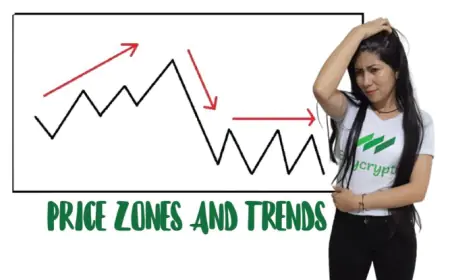The Recent Bitcoin Market Report
The Recent Bitcoin Market Report provides an in-depth analysis of the current state of the Bitcoin market, highlighting key trends, challenges, and opportunities for investors. This report covers a range of topics, including the latest price trends, regulatory developments, and the potential impact of emerging technologies on the cryptocurrency market. Whether you are an experienced investor or just getting started in the world of Bitcoin, this report is a must-read for anyone interested in the future of digital assets.

The world of Bitcoin and cryptocurrencies is constantly evolving, with new developments, trends, and challenges emerging on a regular basis. As an investor or enthusiast in this space, it can be challenging to keep up with the latest news and developments, let alone make sense of what it all means for your investment strategy. That's why staying informed with up-to-date market reports is crucial to success. In this post, we will take a closer look at the recent Bitcoin market report, providing you with valuable insights into the current state of the Bitcoin market, and what it means for the future of digital assets.
The Current State of the Bitcoin Market: Insights from the Latest Market Report
The latest Bitcoin market report provides a comprehensive overview of the current state of the cryptocurrency market, covering everything from the latest price trends to regulatory developments and emerging technologies. One of the key takeaways from the report is the growing interest in Bitcoin and other digital assets as a hedge against inflation and a viable alternative investment option.
According to the report, Bitcoin's recent surge past $28K in response to CPI is just one example of the growing interest in digital assets among investors looking to diversify their portfolios and protect against inflation. With central banks around the world continuing to print money and lower interest rates, many investors are turning to Bitcoin as a way to preserve the value of their investments and hedge against currency devaluation.
In addition to the growing interest in Bitcoin as a hedge against inflation, the report highlights several other factors driving the cryptocurrency market, including institutional adoption, mainstream acceptance, and the impact of emerging technologies. The report notes that institutional investors are increasingly turning to Bitcoin as a way to diversify their portfolios and tap into the potential returns of the cryptocurrency market. At the same time, mainstream acceptance of Bitcoin and other digital assets is growing, with more retailers and businesses accepting cryptocurrency payments than ever before.
Another key factor driving the cryptocurrency market is the emergence of new technologies, such as decentralized finance (DeFi) and non-fungible tokens (NFTs). These technologies have the potential to disrupt traditional financial systems and unlock new opportunities for investors in the cryptocurrency market.
Overall, the latest Bitcoin market report provides valuable insights into the current state of the cryptocurrency market and what it means for investors. While there are certainly challenges and risks associated with investing in digital assets, the report highlights the many opportunities that exist in this dynamic and rapidly-evolving market. In the next section of this post, we will take a closer look at some of the challenges and risks associated with investing in Bitcoin and other digital assets.
Challenges and Risks of Investing in Bitcoin and Digital Assets
As exciting as the potential opportunities in the cryptocurrency market may be, it's important to acknowledge that investing in Bitcoin and other digital assets also comes with significant challenges and risks. One of the most notable challenges of investing in Bitcoin is the high level of volatility and unpredictability in the market. The price of Bitcoin can fluctuate wildly in a short amount of time, making it difficult to predict and manage risk effectively.
Another major challenge of investing in Bitcoin is the regulatory attention the market has been receiving in recent years. As Bitcoin and other digital assets continue to grow in popularity and gain mainstream acceptance, governments around the world are beginning to take notice and establish regulatory frameworks to govern their use and trade. While this can help to legitimize the market and provide some level of stability and security for investors, it can also create additional compliance costs and uncertainties.
In addition to these challenges, investing in Bitcoin and other digital assets also comes with several inherent risks that investors must be aware of. One of the biggest risks is the potential for fraud and hacking, as digital assets are vulnerable to theft and cyber attacks. Additionally, digital assets are not backed by any government or financial institution, which means that investors could potentially lose their entire investment if the market were to crash or experience a major correction.
Despite these challenges and risks, many investors are still drawn to the potential opportunities presented by the cryptocurrency market. As we move into the future, it's likely that the market will continue to evolve and change, presenting new challenges and opportunities for investors to navigate. In the next section of this post, we will take a closer look at some of the strategies and best practices that investors can use to manage risk and maximize their returns in the cryptocurrency market.
Best Practices for Investing in Bitcoin and Digital Assets
While investing in Bitcoin and digital assets comes with a unique set of challenges and risks, there are also several best practices that investors can use to manage their risk and maximize their returns. One of the most important best practices is to always do your own research and due diligence before investing in any digital asset. This means understanding the underlying technology and fundamentals of the asset, as well as evaluating the team behind the project and any potential risks or red flags.
Another best practice for investing in Bitcoin and digital assets is to diversify your portfolio. Instead of putting all of your money into one asset, consider investing in a variety of different assets to spread out your risk and increase your chances of success. This could include investing in different types of cryptocurrencies, as well as other digital assets like non-fungible tokens (NFTs) or decentralized finance (DeFi) projects.
Finally, it's important to stay up-to-date with the latest news and developments in the cryptocurrency market. This can help you stay informed about any regulatory changes or market trends that could impact your investments, as well as identify potential opportunities to enter or exit the market.
In conclusion, investing in Bitcoin and digital assets can be a highly rewarding but also challenging endeavor. By understanding the risks and challenges of the market, as well as implementing best practices for managing risk and maximizing returns, investors can position themselves for success in the rapidly evolving world of cryptocurrency.
What's Your Reaction?
 Like
0
Like
0
 Dislike
0
Dislike
0
 Love
0
Love
0
 Funny
0
Funny
0
 Angry
0
Angry
0
 Sad
0
Sad
0
 Wow
0
Wow
0










































